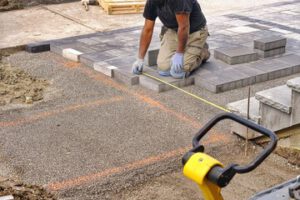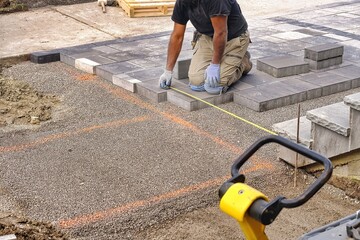A new driveway can significantly increase a home’s value. However, picking the right material to withstand traffic and weather conditions can take time and effort. Concrete is popular and affordable but could be better in colder climates. Asphalt, a popular second choice, looks great and should be sealed every three to five years. For professional expertise, visit SC Driveway Paving Charleston.
 The cost of driveway paving can vary greatly depending on the type of materials used and the project’s size or size. Generally, asphalt and concrete are the most expensive options, while gravel and pavers are cheaper. However, it is important to consider all of the expenses involved with paving of your driveway to ensure you get the most value for your money.
The cost of driveway paving can vary greatly depending on the type of materials used and the project’s size or size. Generally, asphalt and concrete are the most expensive options, while gravel and pavers are cheaper. However, it is important to consider all of the expenses involved with paving of your driveway to ensure you get the most value for your money.
Before the paving begins, the site must be leveled and cleared of all debris. This may include tree branches, stumps, rocks, and other debris that must be removed from the area. This process can take up to ten days and will significantly increase the total cost of the job.
In addition, the contractor will need to prepare the ground by grading and excavating the surface of the driveway. This will ensure the finished product is level and free of drainage problems. The cost of this labor will be included in the final paving estimate.
After the preparation work has been completed, the paving company will install the chosen material. While the choice of paving material is up to the individual homeowner, most people choose either asphalt or concrete. These two materials are relatively affordable and can be aesthetically enhanced with borders, colors, and stamped patterns.
Other options for paving the driveway include recycled rubber, which is eco-friendly and fairly affordable. It can also withstand cold temperatures better than other materials. However, it is prone to cracking and requires regular maintenance.
Some of the other choices for a new driveway include brick, natural stone, and decorative gravel. Each option has its pros and cons, so it is best to consult a professional before making a decision.
It is important to choose a material that will stand up to the climate in which you live. Some materials do not hold up well in hot weather, which can lead to early wear and tear. Additionally, certain plants are able to penetrate the surface of asphalt, which can cause damage. This can be avoided by using a more durable material, such as concrete or pavers.
Materials
When choosing a material for your driveway, it’s important to consider both function and appearance. Your driveway is not only a way to get from point A to point B, but it also adds curb appeal and helps set the tone for your home.
Asphalt, concrete, gravel and pavers are the four most common choices for driveway paving. Each one has its own unique advantages and disadvantages. Ultimately, the decision comes down to your preference and the climate in which you live.
Pavers are made of natural materials that seamlessly integrate with the landscape. They are durable and can withstand heavy loads, making them ideal for driveways. They are also easy to maintain and can last for a long time. However, pavers can be expensive, especially if you choose a more decorative design.
The first step in the installation process is removing any existing surface and preparing the ground for new paving. This is accomplished by leveling the surface and grading it to create an even slope. Then, a layer of gravel or crushed rock is placed over the grade and compacted. This is referred to as the sub-base. The thickness of the base is influenced by the region’s climate and type of soil, as cold regions with silt or clay require a thicker base than well-drained soil in warm areas.
After the sub-base is laid, the paving contractor applies the binder and runner-crush layers of the pavement. The binder is a black, jet-black bituminous substance that adheres the sand and stone together. It is heated to high temperatures in order to liquefy it and bond the sand and stone together.
A geo-textile fabric is then installed over the runner-crush layer to prevent the pavement from rutting. It is a thick, woven-nylon sheet that acts as a filter between the sub-grade and runner-crush, keeping them from mixing and providing stability. This layer also allows water to percolate through and back into the groundwater supply, rather than pooling and causing damage. Lastly, a layer of polymeric jointing sand is swept into all the joints and crevasses in the interlocking pavers to limit weed growth.
Installation
A driveway paving project is more than just digging up the ground and laying down some pavers. It requires a lot of planning and the right equipment to be done properly. Most of the time, a professional is hired to do the work. However, if you have the know-how and the proper equipment, you can save some money by doing it yourself. You can also choose from several different types of materials and designs for your driveway paving project. But before you decide on a particular material, you should consider the maintenance and cost involved.
A permeable-paver driveway is a great option for homeowners who want to reduce their carbon footprint and have an eco-friendly surface. The installation process is a little different than that of a traditional asphalt driveway, so it’s important to hire a team of professionals who have experience with this type of project.
The first step in the paving process is to remove any existing materials from the driveway area. This may include gravel or a previously paved space that is damaged or worn. The paving company will then dispose of this material.
After removing any existing material, the paving contractor will prepare the area for laying the pavers. This includes excavating the site and testing the soil for permeability. This process is critical, as it ensures that the new paving will be able to absorb and transport water without any issues. It’s also important to check for underground pipes and cables. This can be a lengthy process and is often expensive, but it’s essential to do a thorough job in order to have a durable, long-lasting driveway.
Once the area has been excavated and all utilities have been located, a base can be installed. This will typically include a layer of crushed stone and sand. This layer is designed to help hold the pavers in place and prevent them from moving over time.
The pavers themselves can be made from a variety of materials, including brick, rock, or concrete. They are available in a wide range of shapes, sizes, and colors, so you can choose the ones that will best suit your home’s style. Once the pavers have been installed, they are sanded down and sealed to ensure that they will last for a long time.
Maintenance
Block paving is a durable material and can last a long time if it is looked after properly. However, over time the paving can become dirty and look untidy. This can be caused by oil stains or by the growth of moss or weeds. It is important to keep your paved area clean and tidy as this will help to prevent the growth of these unwanted plants and to keep your driveway looking its best.
Different types of paving require different maintenance procedures. Some are more susceptible to damage than others, so it is important to understand what steps should be taken to protect your investment and maintain its longevity. These procedures can include sweeping, washing, and regular cleaning of the paving. It is also a good idea to use a pressure washer on the surface, as this can remove dirt and other materials that may damage the paving.
To keep your paving in optimum condition, you should sweep the surface regularly with a soft brush or broom. This will remove any accumulated dirt and dust that can be easily brushed away. You should also clean the paving using a bucket of water and non-acid cleaner or soapy washing up liquid to ensure that any remaining muck is removed. After cleaning the paving, you should always brush the joints with sand to prevent them from becoming overgrown with moss and weeds.
If your paving is exposed to the elements, you should consider protecting it with a concrete barrier. This will prevent deterioration and cracking and protect your vehicle from impact damage. You should also make sure that your driveway is not too high above the surrounding soil, as this could cause drainage problems.
Some paving is permeable, which means that it allows water to pass through and avoids puddling or surface icing. This is ideal if you live in an area with high rainfall or in a wet climate. Permeable paving is also environmentally friendly and can lower your cooling costs. However, it can be expensive to install and requires regular resealing to maintain its quality.
